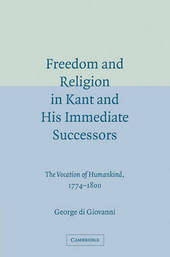
|
Freedom and Religion in Kant and his Immediate Successors: The Vocation of Humankind, 1774-1800
Paperback / softback
Main Details
| Title |
Freedom and Religion in Kant and his Immediate Successors: The Vocation of Humankind, 1774-1800
|
| Authors and Contributors |
By (author) George di Giovanni
|
| Physical Properties |
| Format:Paperback / softback | | Pages:396 | | Dimensions(mm): Height 229,Width 152 |
|
| Category/Genre | Western philosophy - c 1600 to c 1900
Philosophy of religion |
|---|
| ISBN/Barcode |
9780521099813
|
| Classifications | Dewey:193 193 |
|---|
| Audience | | Professional & Vocational | |
|---|
| Illustrations |
Worked examples or Exercises
|
|
Publishing Details |
| Publisher |
Cambridge University Press
|
| Imprint |
Cambridge University Press
|
| Publication Date |
18 January 2009 |
| Publication Country |
United Kingdom
|
Description
The theologians of the late German Enlightenment saw in Kant's Critique of Pure Reason a new rational defence of their Christian faith. In fact, Kant's critical theory of meaning and moral law totally subverted the spirit of that faith. This challenging new study examines the contribution made by the Critique of Pure Reason to this change of meaning. George di Giovanni stresses the revolutionary character of Kant's critical thought but also reveals how this thought was being held hostage to unwarranted metaphysical assumptions that caused much confusion and rendered the First Critique vulnerable to being reabsorbed into modes of thought typical of Enlightenment popular philosophy. Amongst the striking features of this book are nuanced interpretations of Jacobi and Reinhold, a lucid exposition of Fichte's early thought, and a rare, detailed account of Enlightenment popular philosophy.
Author Biography
George di Giovanni is Professor of Philosophy at McGill University.
Reviews'Most of the figures discussed by di Giovanni have been almost entirely ignored - and not only by Anglophones - and most of their works are now almost entirely unobtainable. For this reason alone, di Giovanni's discussion of their work is very valuable. But not only for this reason ... His treatment of these philosophers is almost always philosophically incisive, penetrating to the heart of a doctrine and revealing its underlying point and abiding relevance.' Frederick Beiser, author of The Fate of Reason ' ... a magnificent addition to Cambridge's powerful list in German philosophy ...' Paul Guyer
|